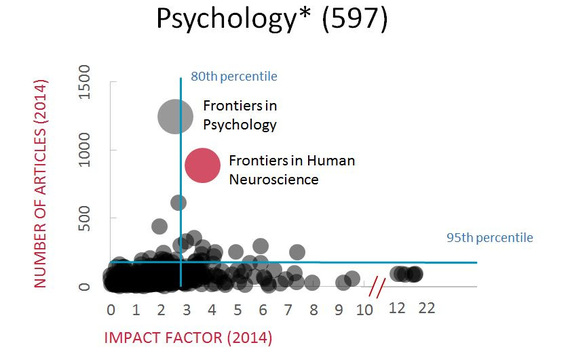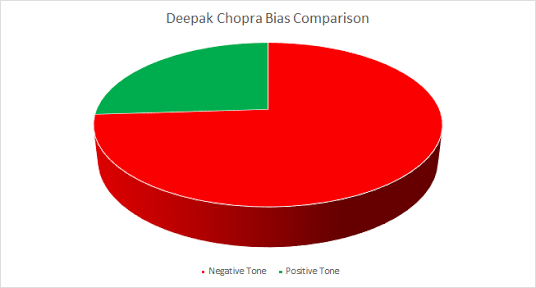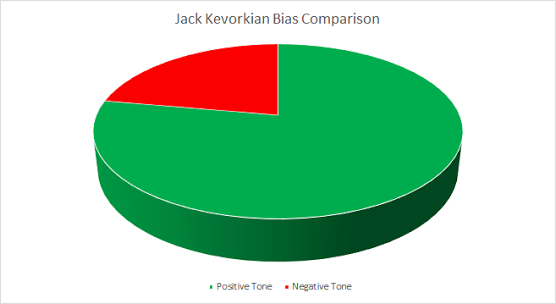An Insider's Point-by-Point Rebuttal of the Bias and Deception on One of Wikipedia's Most Contentious Pages
Note: Referenced material includes links to Wikipedia Differences Between Revisions, unalterable snapshots of online conversations.
Since the first article was published about Wikipedia's dishonest biography on Deepak Chopra and the online harassment that surrounds it, three major developments have occurred. First the Wikipedia editors involved dramatically increased their condemnation of Dr. Chopra, and secondly they harassed the writer of the article across Wikipedia and the internet. Given that this was precisely the behavior they were being critiqued for, these consequences were predictable.
The third consequence was more surprising: the public, including Wikipedians, voiced their outrage at the manipulation of facts, sharing and retweeting the article thousands of times. As disgraceful as the denigration of a man for ideological purposes is, it was the systematic distortion of truth on the most widely used information website that especially angered and frightened readers. While the skeptics tried to pound home their orthodoxy by dominating the forums, editors like you succeeded in increasing the pressure for a more balanced article. This has already resulted in the deletion of the Bibliography section that spoke of burning Chopra's books, and has been growing steadily as more people get involved.

This does not mean the page is neutral, however, and the orthodox-skeptics have grown even more aggressive. They have declared anyone who has ever taken Deepak Chopra seriously to be a dangerously gullible fool, and have taken it upon themselves to defend the public from unsafe ideas. When editors with an agenda can subtly misinform the public on a mass scale, how do people find information about controversial or cutting edge ideas and figures?
The answer is by relying hard facts and science. In recognition of the concerns readers expressed about specific cases of misinformation, ISHAR has compiled a list of 5 of the most misleading and/or biased arguments on Wikipedia's Deepak Chopra Talk Page, where the content of the biography gets decided. Each of these will be debunked with verifiable facts.
1) There's nothing to discuss about Deepak Chopra other than that he is a controversial for his New Age alternative medicine. He has no notable writings and absolutely no research, so all Wikipedia can do is talk about his critics.
(Referenced
,
, and
)This argument is as pervasive on Wikipedia as it is easily proven false. Assuming that his medical work, more than 80 books (including 22 NYT Bestsellers) and hundreds of
are not notable enough, there is research and scientific work that Dr. Chopra is involved in that debunks this claim.
The last is published in Frontiers in Human Neuroscience, a well-regarded peer-reviewed journal that is in the top 9% of impact factors for its fields - 89% higher than the average for psychology journals, and is the 10th most cited neuroscience journal in 2014 based on articles published in 2012 and 2013.
Even more notable, and far more so than any of the skeptic bloggers currently cited on Deepak Chopra's Wikipedia page, is his ongoing work with
, one of the most prestigious scientific research facilities in the world. In an effort to measure the cardiovascular effects of meditation, Scripps scientists reported that they "teamed with renowned physician Deepak Chopra" to study meditation in a cutting edge research program that could have major medical impacts.
One would think
should be more notable than name-calling bloggers, but not according to the orthodox-skeptics on Wikipedia.
2) All of Deepak Chopra's positions, such as Ayurveda, have been scientifically disproven, so he's just a pseudoscientist. It's a fact there's never been one piece of evidence for Ayurveda!
(Referenced
,
,
, and
)Wrong on all counts, actually. Dr. Chopra practices
, which also includes mainstream Western medicine, which even the most orthodox of skeptics would concede is scientifically supported. The elements of other medical approaches that he incorporates, such as the traditional Indian system Ayurveda, have also been intensely studied by medical researchers. There is solid evidence for many aspects of Ayurveda, some areas that require further research, and some that are scientifically unsupported. The same is true of any healthcare approach, including pharmaceuticals. Yet the orthodox-skeptics on Wikipedia demand that Ayurveda (and Dr. Chopra's use of it) must be described as completely useless and unscientific.How do they justify this claim in the face of
? Through a set of Catch-22 requirements, all in the name of "quality control":
- Any "scientifically accepted" aspects of Ayurveda cannot be listed, as they are not indicative of the supposed unacceptability of Ayurveda (see: paradox). That means the fact that Ayurveda prescribes meditation, yoga, good diet, and exercise cannot be listed, despite being proven treatments.
- Medical studies supporting Ayurveda cannot be considered because they are not broad enough.
- Large-scale texts supporting Ayurveda cannot be considered because they are too broad.
- Ayurvedic research done by Ayurvedic researchers cannot be allowed, since they obviously believe in Ayurveda and are thus untrustworthy.
- The general medical establishment of the nation of India is not applicable, as it has Ayurveda as part of its standard medical education and is therefore unscientific.
- Any medical study of Ayurveda must be published in a highly reputable medical journal in order to be considered legitimate.
- Any medical journal that publishes an Ayurvedic study shall not be considered reputable, since Ayurveda is illegitimate.
If all else fails, there is always blatant lying. One of the few studies to survive the labyrinth of requirements above is from Cancer Research UK, a highly regarded source on medical approaches and healthcare. The
describes its ability to lower stress, relieve cancer related symptoms, improve quality of life, reduce anxiety, lower blood pressure, boost general wellbeing, and improve sleep patterns in lymphoma patients. Some early laboratory and animal research suggests that compounds taken from traditional Ayurvedic medicines may even be able to slow the growth of cancer cells in animals, offering a promising field for research.Or, as the skeptics summarize the
,
"there is, however, nothing in Ayurvedic medicine that is known to be effective at treating disease, and some preparations may be actively harmful..."
3) Deepak Chopra is a quack who is condemned by the scientific community. Everyone in the sciences, and I mean everyone, agrees.
(Referenced
,
,
,
,
, and
)Someone should really tell the scientific community about this, because they have clearly not gotten the memo that they are all supposed to despise Dr. Chopra. It is possible that is because many were too busy working with him.
Scientists and Physicians Who Have Worked With Deepak Chopra:
- Aniraban Bandyopadhyay, PhD
- Bernardo Kastrup, PhD
- Donald Hoffman PhD
- Elissa Epel, PhD
- Elizabeth Blackburn, PhD (Nobel Laureate)
- Erhard Seiler, PhD
- Eric Schadt, PhD
- Eric Topol, PhD
- Frank Wilczek, PhD (Nobel Laurate)
- Henry Stapp, PhD
- Joel Primack, PhD
- Josephine P Briggs, MD
- Keith Black, MD
- Menas Kafatos, PhD
- Murali Doraiswamy, MD
- Nancy Abrams, JD
- Neil Theise, MD
- Paul Mills, PhD
- Pim van Lommel, MD
- Rudolph Tanzi, PhD
- Sheila Patel, MD
- Stanley Klein, PhD
- Steven Steinhubel, MD
- Stuart Hameroff, MD
- Thomas Insel, MD
- VA Shiva Ayyadurai, PhD
- Hans Peter Durr (deceased)
- Henry Stapp, PhD
- Dimitar Sasselov, PhD
- Amit Goswami, PhD
- Bernard Haisch, PhD
- Bruce Rosenblum, PhD
- Candace Pert (deceased)
- Daniel Siegel, MD
- Dean Ornish, MD
- Dean Radin, PhD
- Elisabet Sahtouris, PhD
- Elizabeth Thompson
- Fred Kuttner, PhD
- Keith Black, MD
- Subhash Kak, PhD
- Michio Kaku, PhD
- Lothar Schafer, PhD
Then again, they may not have paid attention because many have already expressed their disagreement with Wikipedia's attempts to speak for them. In an official petition on ISHARonline.org, numerous scientists specifically
.
Whether or not I share all of his views, I consider Deepak Chopra to be a legitimate figure in the medical and scientific field. As a member of the scientific community I do not endorse the claim that Deepak Chopra must be dismissed or condemned by that group. I am familiar with examples of Deepak Chopra's work that are, to my knowledge, as well supported and valuable as those of many other accepted figures in science.
The orthodox-skeptics used an offhand comment in a Lifestyle article to justify their depiction of the entirety of the scientific community, apparently hoping no one would question the source. Unfortunately for them, the scientific community has a habit of speaking up.
4) The Huffington Post Wikipedia article was completely inaccurate and just wants Wikipedia to become an advertising venue for Deepak Chopra's vanity.
(Referenced
,
,
, and
)This has been repeated by many of the hostile editors, both on Wikipedia and a variety of orthodox-skeptical blogs. There is virtually nothing to debunk, however, as none of them was able to point to a single statement that was inaccurate. Not one. To recap, the factually and statistically supported facts from
that went unrefuted include:
- Despite 95% of news coverage of Deepak Chopra being positive, Wikipedia editors insist that only the 5% that is negative is "notable" enough to be included.
- There are patterns of double standards and abuse intended to harass editors who try to reference any non-negative content.
- That Dr. Deepak Chopra has 14 times more negative Wikipedia commentary about him than Dr. Jack Kevorkian, despite the latter being obviously much more controversial.
- The same critical quotes are used over and over again in different sections in order to increase the odds of any given section having negative content.
The claim that the article was pushing for a Chopra vanity project ignores the fact that the article's position, and that of ISHAR Online in general, is that objective facts, carefully weighed with an open mind, should determine the content of any informational website. Nothing but facts were encouraged, nothing but objective misinformation was criticized.
5) You can't edit this page because you're too ignorant of Wikipedia policies (and jargon). You have to be completely fluent in WP:MEDRS in order to cite refs on a BLP that's subject to WP:FRINGE & WP:REDFLAG, or you'll violate NPOV, get reverted and be sent to ARBCOM.
This is the most tragic misinformation on Wikipedia, because it robs the world of the potential contributions of hundreds of minds who are put off by bullying editors. Despite the sea of jargon these editors spew forth and the constant insistence upon policies and rules, their obsession with orthodoxy has blinded them to one of the founding Pillars of Wikipedia: There are no firm rules. Wikipedia is intended to bring in diverse perspectives, regardless of the buzzwords more experienced Wikipedians toss around, newcomer's voices are just as important as Wikipedia's founder, Jimmy Wales. If the current rules cannot resolve the abuses listed above, they can and should change.
While enormous work has gone into Wikipedia policies and new editors should be familiar with them, there is also enormous amounts of new work left to be done. The problems listed in these articles are highly visible on Deepak Chopra's page, but are not unique to it. Wikipedia is free to all and open to all who wish to improve humanity's body of knowledge. Anyone reading this article is capable of contributing to Wikipedia, all that is necessary is patience and the will to act. If there is misinformation occurring, it is the responsibility of all who know better to do something about it. Go here to learn how to edit Wikipedia and, if the above behavior seems unethical, remedy it.
There's a common saying on Wikipedia: if someone notices a problem and asks why it has not been fixed, the traditional answer is "Because you haven't fixed it yet."
Let's fix it.
Our 2024 Coverage Needs You
It's Another Trump-Biden Showdown — And We Need Your Help
The Future Of Democracy Is At Stake
Our 2024 Coverage Needs You
Your Loyalty Means The World To Us
As Americans head to the polls in 2024, the very future of our country is at stake. At HuffPost, we believe that a free press is critical to creating well-informed voters. That's why our journalism is free for everyone, even though other newsrooms retreat behind expensive paywalls.
Our journalists will continue to cover the twists and turns during this historic presidential election. With your help, we'll bring you hard-hitting investigations, well-researched analysis and timely takes you can't find elsewhere. Reporting in this current political climate is a responsibility we do not take lightly, and we thank you for your support.
Contribute as little as $2 to keep our news free for all.
Can't afford to donate? Support HuffPost by creating a free account and log in while you read.
The 2024 election is heating up, and women's rights, health care, voting rights, and the very future of democracy are all at stake. Donald Trump will face Joe Biden in the most consequential vote of our time. And HuffPost will be there, covering every twist and turn. America's future hangs in the balance. Would you consider contributing to support our journalism and keep it free for all during this critical season?
HuffPost believes news should be accessible to everyone, regardless of their ability to pay for it. We rely on readers like you to help fund our work. Any contribution you can make — even as little as $2 — goes directly toward supporting the impactful journalism that we will continue to produce this year. Thank you for being part of our story.
Can't afford to donate? Support HuffPost by creating a free account and log in while you read.
It's official: Donald Trump will face Joe Biden this fall in the presidential election. As we face the most consequential presidential election of our time, HuffPost is committed to bringing you up-to-date, accurate news about the 2024 race. While other outlets have retreated behind paywalls, you can trust our news will stay free.
But we can't do it without your help. Reader funding is one of the key ways we support our newsroom. Would you consider making a donation to help fund our news during this critical time? Your contributions are vital to supporting a free press.
Contribute as little as $2 to keep our journalism free and accessible to all.
Can't afford to donate? Support HuffPost by creating a free account and log in while you read.
As Americans head to the polls in 2024, the very future of our country is at stake. At HuffPost, we believe that a free press is critical to creating well-informed voters. That's why our journalism is free for everyone, even though other newsrooms retreat behind expensive paywalls.
Our journalists will continue to cover the twists and turns during this historic presidential election. With your help, we'll bring you hard-hitting investigations, well-researched analysis and timely takes you can't find elsewhere. Reporting in this current political climate is a responsibility we do not take lightly, and we thank you for your support.
Contribute as little as $2 to keep our news free for all.
Can't afford to donate? Support HuffPost by creating a free account and log in while you read.
Dear HuffPost Reader
Thank you for your past contribution to HuffPost. We are sincerely grateful for readers like you who help us ensure that we can keep our journalism free for everyone.
The stakes are high this year, and our 2024 coverage could use continued support. Would you consider becoming a regular HuffPost contributor?
Dear HuffPost Reader
Thank you for your past contribution to HuffPost. We are sincerely grateful for readers like you who help us ensure that we can keep our journalism free for everyone.
The stakes are high this year, and our 2024 coverage could use continued support. If circumstances have changed since you last contributed, we hope you'll consider contributing to HuffPost once more.
Already contributed? Log in to hide these messages.





